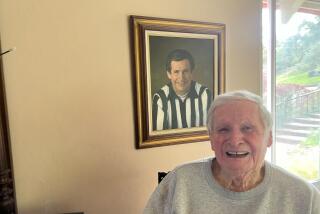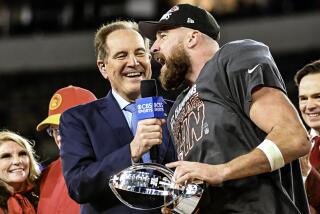The coolest quarterback
- Share via
Ask the average football fan to name the game’s famous players, and the odds are pretty good that Joe Namath, though he hasn’t thrown a pass since Jimmy Carter’s second year in office, will be at the top of the list. If you recognize his name but don’t know why you should, “Namath: A Biography” by former New York Daily News columnist Mark Kriegel will tell you what all the fuss was about.
If Johnny Unitas was the first pro football player your father followed, then Namath was the first your mother noticed. In his time, he spilled drinks on Frank Sinatra and was serenaded by Janis Joplin. As Kriegel relates, Elvis once apologized to Namath for a sub-par performance. (“Joe, I wasn’t at my best tonight. I’ve got a cold.”) How sought after was Joe at the peak of his popularity? His own coach couldn’t coax his agent into giving him his phone number.
Namath was born of Hungarian ancestry in the tough mill town of Beaver Falls, Pa. He was possessed of a dazzling grin and such sensational, brooding good looks that, according to a neighbor, “Even the nuns [at St. Mary’s High School] were charmed.” He was raised by his mother after his parents’ divorce; his father made just one contribution to his son’s future, but it was substantial. When Namath was 11, his dad took him to the steel mill where he worked. “It was terrifying,” Namath recalled. “The noise. The heat. The molten metal. I vowed I would never work in such a place, and to this day I’m convinced that’s why he took me there.” Sports were a far more promising alternative. “We always knew he was a quarterback,” says a friend from Beaver Falls. “We knew before anybody.”
But Namath had something besides talent: “Cool made American boys different from their immigrant fathers. Cool was the bop in your step, the pearl in your cap, the cigarette dangling from your lip.” Namath would bring cool to the world of professional sports. He was the incredibly right person for football at the spectacularly right time in the game’s history. Recruited by the most famous of all college coaches, University of Alabama’s Paul “Bear” Bryant, he would “hate Bryant, fear him, and love him.... In Bryant, Joe had found an outrageously outsized father figure, a man he wanted to please.”
Bryant molded Namath into the most wanted college recruit in the country at precisely the time that professional football had overtaken baseball as a television attraction. In 1965, the old National and the upstart American Football Leagues were in an intense bidding war for college talent; the result for Namath was a staggering $400,000 signing bonus from the New York Jets.
His rocket to fame was fueled by awe-inspiring talent and brash wit. When a smart-aleck Eastern sportswriter asked him whether he had majored in basket-weaving at Alabama, Namath shot back, “Nah, that class was all filled up. But I found an even easier one -- journalism.” In the 1969 Super Bowl he led the AFL champion Jets to the most widely heralded upset in pro football history -- after publicly guaranteeing he would do so. But Namath was already a household name before that game, a tabloid star who dated movie stars (Mamie Van Doren once picked him up at practice in her sports car) and hung with gamblers and mob figures. (The latter association landed him under FBI surveillance and on the Nixon White House “enemies list.”)
From the time he was “Joe Willie” at Alabama to his emergence as “Broadway Joe” in New York, he openly lived the fantasy life that earlier sports stars like Mickey Mantle had to hide. In Namath, says Kriegel, “One saw fame without fear.”
Kriegel threads the needle on the source of Namath’s appeal. He was never a hippie; his star shined brightest in the age of Aquarius, but his musical taste ran less to the Rolling Stones and Grateful Dead and more toward Tom Jones. “Hippies,” writes Kriegel, “didn’t play golf nor did they sip blended Scotch at the Palm Bay Club.” Rather, Namath was something special; he was, as Kriegel quotes the New York Times’ James Reston, “a long-haired hard hat.”
The prime of Joe Namath was astonishingly short. A series of injuries left him, in his late 20s, with, said a surgeon, “the knees of a seventy-year-old man.” The Namath-era Jets had just three winning seasons. “No team in any sport,” writes Kriegel, “has remained so tethered, for so long, to the memory of a single star.”
There’s no way Namath’s post-football career could have been anything but a letdown. He became an actor -- and not a bad one either, garnering good reviews for an off-Broadway Chekhov production. But Namath was, surprisingly, temperamentally unsuited to show business: “It’s fun at times,” he said, “but I still don’t feel comfortable.” (To his own surprise and that of most who knew him, he would be far more comfortable in the role of devoted father to his two daughters.) He passed up a chance to audition for the lead in the TV series “Cheers.” Kriegel says: “What most actors lust for, the desire that charges careers, Namath had long since tired of.” Actors want enormous fame, and “he was already famous.”
Besides, as Kriegel’s irreverent and highly entertaining book shows, Joe Namath had already succeeded as a performer. When he came to the NFL, pro football was a game; by the time he left, it was show business. *
More to Read
Go beyond the scoreboard
Get the latest on L.A.'s teams in the daily Sports Report newsletter.
You may occasionally receive promotional content from the Los Angeles Times.










